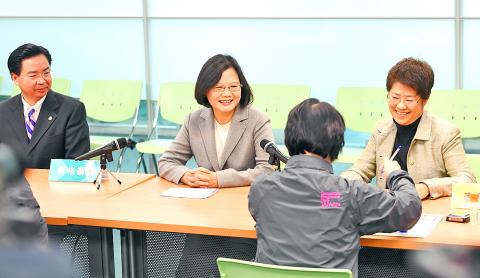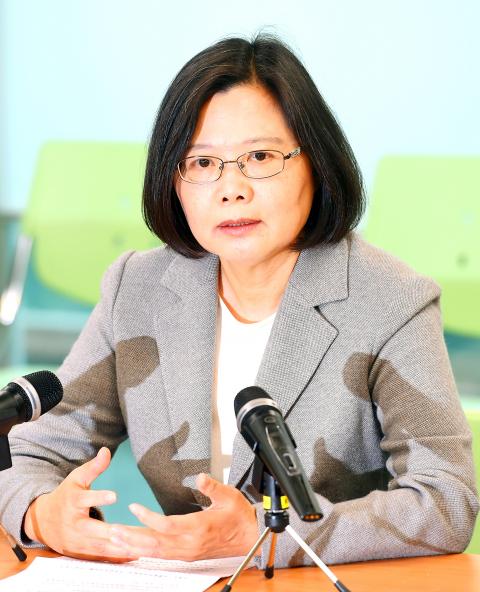Democratic Progressive Party (DPP) Chairperson Tsai Ing-wen (蔡英文) yesterday officially signed up for the party’s primary for next year’s presidential election, vowing to defend the nation and look after the public.
Accompanied by Thinking Taiwan Foundation chief executive director Angela Chang (張振亞), Tsai arrived at DPP headquarters in Taipei yesterday morning to register for the party’s primary election.
Tsai filled out the forms and handed over NT$5 million (US$158,856) — a NT$4 million primary registration fee and a NT$1 million opinion poll fee — at the registration counter.

Photo: Lo Pei-der, Taipei Times
Entering the race for the second time, Tsai said she has traveled extensively around the nation over the past few years and feels that Taiwanese are disappointed with the current political culture, and that there is very little trust in the government’s ability to govern.
Despite suffering and difficulties, most people had not given up, Tsai said, but continue to struggle.
“The strong will of the public is not an excuse for politicians to sit and watch. Instead, someone must stand for the public so they feel that there is someone defending the nation, governing and looking after them,” Tsai said. “I hope I have the opportunity to work for the public.”

Photo: Lo Pei-der, Taipei Times
She also rejected Chinese Nationalist Party (KMT) claims that her policy agenda since the 2012 presidential election has been empty.
“Such criticism shows that the KMT has not really reflected on its failures,” Tsai said. “The KMT has tried to copy my proposals on housing, social and economic policies, but since we have different values and visions, their attempts have not been successful.”
Tsai said it is still too early to discuss her future campaign partner.
In related news, Taipei Veterans’ General Hospital physician and DPP member Kuo Cheng-deng (郭正典) showed up at party headquarters at about 3:45pm yesterday to obtain a copy of the registration form, expressing his wish to sign up for the primary.
However, Kuo said he did not have the NT$5 million registration fee, and called on his friends and anyone who would support him to help him collect the money before today’s registration deadline.
Besides Kuo, two DPP heavyweights — former DPP chairman Su Tseng-chang (蘇貞昌) and Tainan Mayor William Lai (賴清德) — have previously said that they would not take part in the primary.

Intelligence agents have recorded 510,000 instances of “controversial information” being spread online by the Chinese Communist Party (CCP) so far this year, the National Security Bureau (NSB) said in a report yesterday, as it warned of artificial intelligence (AI) being employed to generate destabilizing misinformation. The bureau submitted a written report to the Legislative Yuan in preparation for National Security Bureau Director-General Tsai Ming-yen’s (蔡明彥) appearance before the Foreign Affairs and National Defense Committee today. The CCP has been using cognitive warfare to divide Taiwanese society by commenting on controversial issues such as Taiwan Semiconductor Manufacturing Co’s (TSMC, 台積電) investments in the

HELPING HAND: The steering committee of the National Stabilization Fund is expected to hold a meeting to discuss how and when to utilize the fund to help buffer the sell-off The TAIEX plunged 2,065.87 points, or 9.7 percent, to close at 19,232.35 yesterday, the highest single-day percentage loss on record, as investors braced for US President Donald Trump’s tariffs after an extended holiday weekend. Amid the pessimistic atmosphere, 945 listed companies led by large-cap stocks — including Taiwan Semiconductor Manufacturing Co (TSMC, 台積電), Hon Hai Precision Industry Co (鴻海精密) and Largan Precision Co (大立光) — fell by the daily maximum of 10 percent at the close, Taiwan Stock Exchange data showed. The number of listed companies ending limit-down set a new record, the exchange said. The TAIEX plunged by daily maxiumu in just

INVESTIGATION: The case is the latest instance of a DPP figure being implicated in an espionage network accused of allegedly leaking information to Chinese intelligence Democratic Progressive Party (DPP) member Ho Jen-chieh (何仁傑) was detained and held incommunicado yesterday on suspicion of spying for China during his tenure as assistant to then-minister of foreign affairs Joseph Wu (吳釗燮). The Taipei District Prosecutors’ Office said Ho was implicated during its investigation into alleged spying activities by former Presidential Office consultant Wu Shang-yu (吳尚雨). Prosecutors said there is reason to believe Ho breached the National Security Act (國家安全法) by leaking classified Ministry of Foreign Affairs information to Chinese intelligence. Following interrogation, prosecutors petitioned the Taipei District Court to detain Ho, citing concerns over potential collusion or tampering of evidence. The

‘COMPREHENSIVE PLAN’: Lin Chia-lung said that the government was ready to talk about a variety of issues, including investment in and purchases from the US The National Stabilization Fund (NSF) yesterday announced that it would step in to staunch stock market losses for the ninth time in the nation’s history. An NSF board meeting, originally scheduled for Monday next week, was moved to yesterday after stocks plummeted in the wake of US President Donald Trump’s announcement of 32 percent tariffs on Taiwan on Wednesday last week. Board members voted to support the stock market with the NT$500 billion (US$15.15 billion) fund, with injections of funds to begin as soon as today. The NSF in 2000 injected NT$120 billion to stabilize stocks, the most ever. The lowest amount it